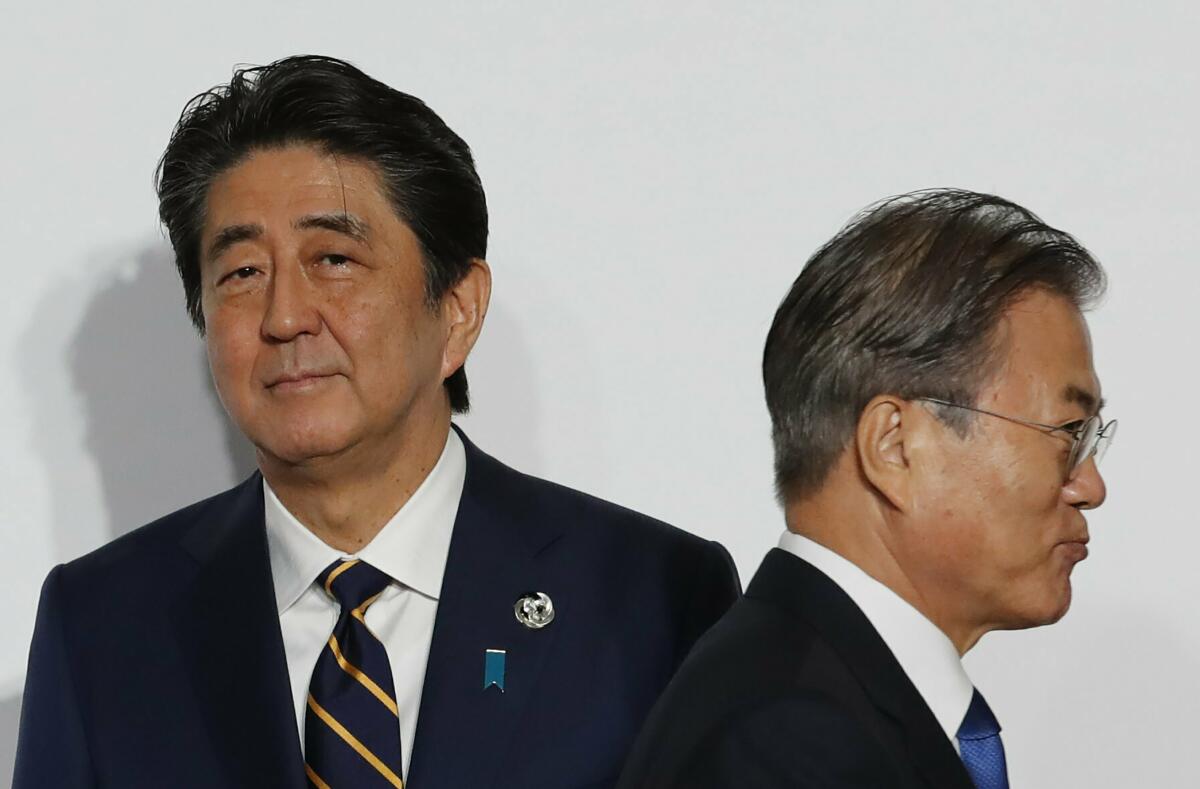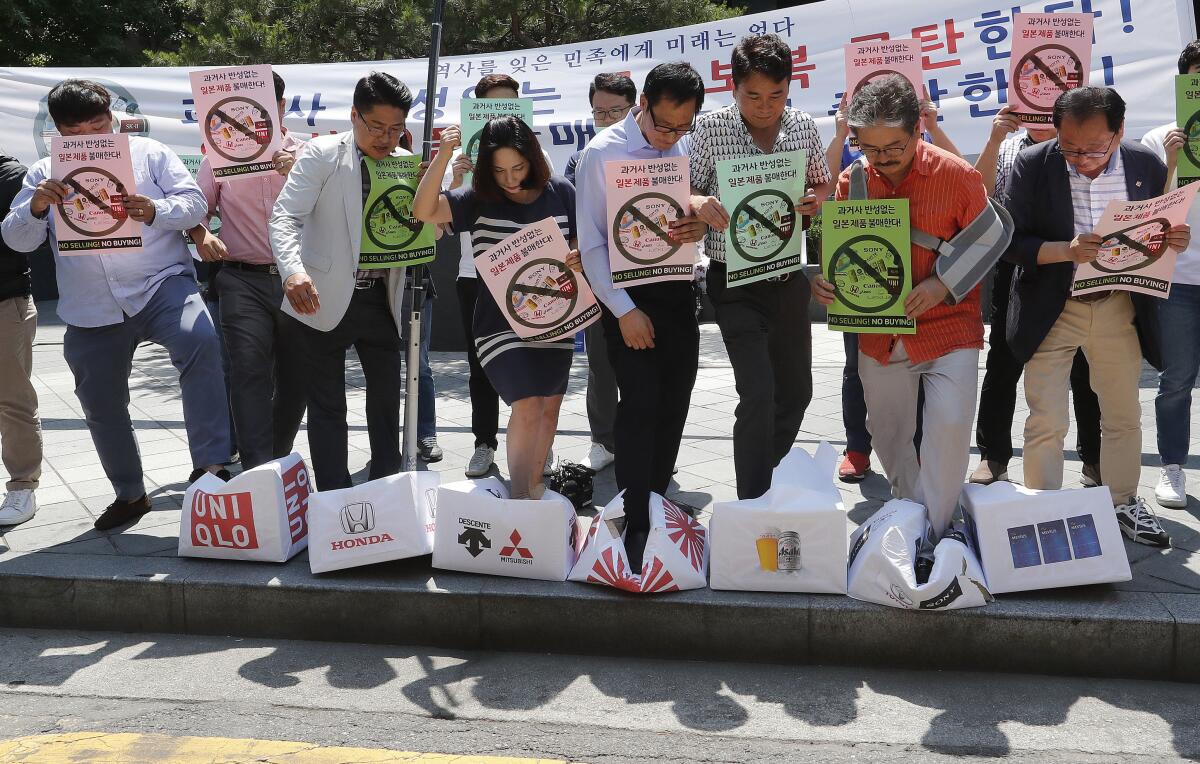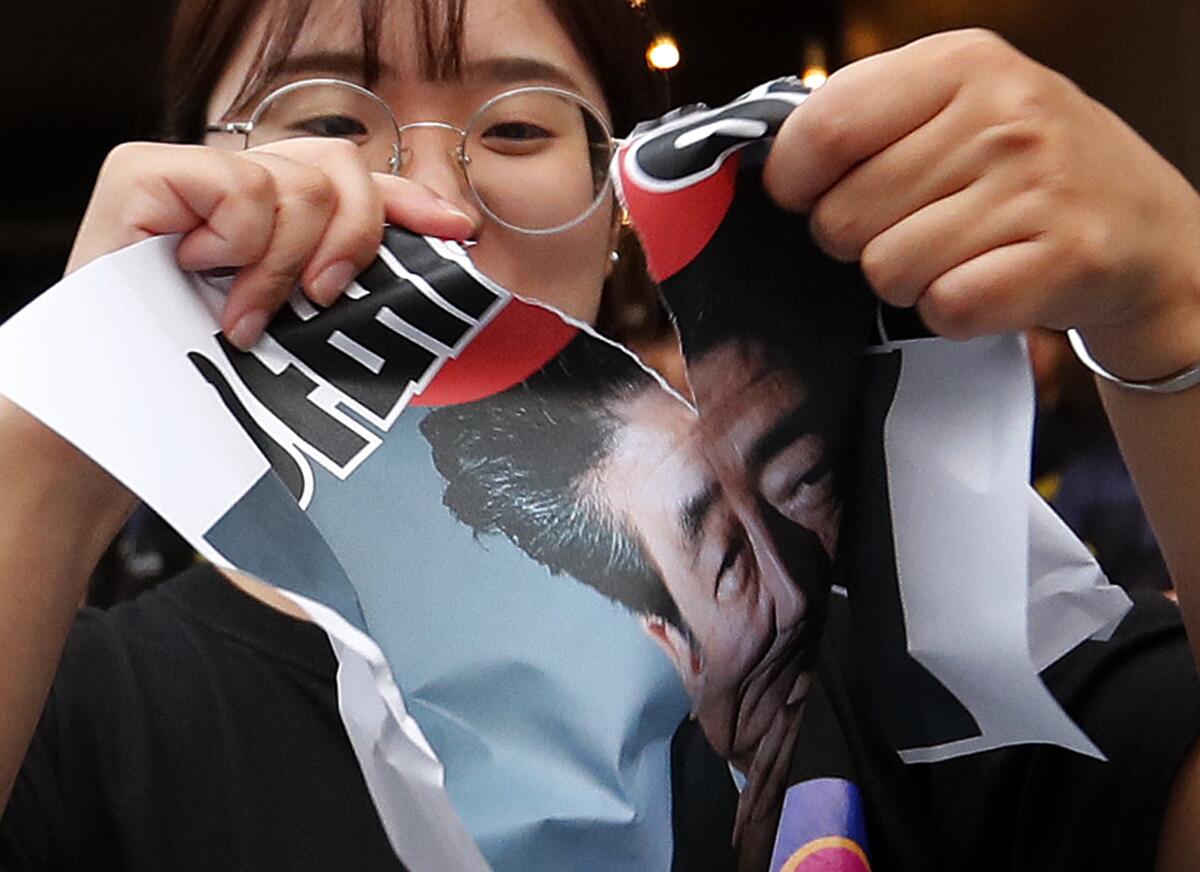Japan uses trade restrictions as a weapon against South Korea

- Share via
SEOUL — Leaders of some of the world’s most powerful nations are posing new threats to the global economy by using trade sanctions to punish and coerce other countries on issues that have no substantial connection to trade or economics.
When Norway awarded a Nobel Prize to a dissident Chinese author in 2010, Beijing responded by clamping down on imports of Norwegian salmon. It punished the Philippines in 2012 with similar tactics over a territorial dispute that had nothing to do with trade.
In the past year, President Trump choked off U.S. high-tech suppliers selling to Chinese companies citing national security, and threatened to slap tariffs on Mexican goods over border issues.
Japan this month became the latest advanced nation to weaponize trade by restricting exports to South Korea of chemicals essential to that country’s vast semiconductor industry. The move came amid a reparations dispute between the two countries tied to when Japan colonized Korea in the early 20th century.
What makes weaponizing trade so risky is that it mixes explosive issues of politics and nationalism into a global economic system that has — for all its imperfections and imbalances — brought greater prosperity and higher living standards to millions. That co-mingling can make it difficult to work out the compromises needed to keep the world economy healthy.
“It really is a dangerous path,” said Phil Levy, a former economic official in the George W. Bush administration and now chief economist at Flexport, a San Francisco-based freight shipment and customs brokerage company.
When countries like Japan start throwing up barriers, Levy said, “the end result is that we can have higher prices and fewer viable industries for a given country. You then see less trade and less wealth.”
Economic sanctions have long been used by the United States and its allies against other countries, but they have generally been confined to major threats to peace and stability: the Russia invasion of Ukraine and North Korea’s nuclear weapons program, for example.

The conflict between neighbors Japan and South Korea started long before anyone was concerned about the semiconductor industry.
That thousands of Korean women were forced to become sex slaves for Japanese soldiers — known euphemistically as “comfort women” — is well known. Less widely understood was the forced labor of many other Koreans by Japanese firms.
The latest dispute between Seoul and Tokyo arises from a court decision last fall on the cases of South Koreans who were conscripted to work for Japanese companies as part of the Japanese war effort during World War II.
Japan maintains those issues were resolved when the two countries normalized relations in 1965 and the Japanese government paid $800 million in aid and loans for its wartime atrocities — funds that were invested by the South Korea to lay the groundwork for its industrialization, but never paid out to individual laborers.
South Korea’s top court ruled in October that the laborers’ lawsuits for compensation from Japanese firms could go forward and cleared the way for victims to go after the companies’ assets in South Korea. South Korean officials say they cannot interfere with the decision of its judiciary.
Each government accuses the other of having been uncooperative in reaching a diplomatic compromise.
Despite flare-ups in tensions over the decades, leaders of Japan and South Korea had steered clear of allowing political disputes to affect the interdependent economic relationship between the two nations, both heavily reliant on exports.
That changed July 1, when Japan announced that any exports of the chemicals fluorinated polyimide, photoresist and hydrogen fluoride — used in smartphone displays and for transferring circuit patterns and etching gas in chips — will require licenses for South Korea that could mean a delay of up to 90 days for major Korean chipmakers including Samsung and SK Hynix.

The move has been met with alarm in South Korea, where semiconductor chips make up a quarter of exports. Japan produces 70% to 90% of the three key materials. The Korea Economic Research Institute estimated that a 30% reduction in the supplies from Japan would mean a 2.2% decline in South Korea’s GDP — to the tune of $35 billion.
“I thought we’d hit bottom, then the basement opened up,” said Shin Gak-soo, a former South Korean ambassador to Japan from 2011 to 2013, about relations between the two countries. “It seems they decided it was an effective means to coerce South Korea into action” to reach a compromise on the forced labor cases.
Japanese authorities have insisted the trade curbs are not connected to historical issues but rather to concern that South Korea does not have appropriate controls for the materials, which can be used in weapons of mass destruction.
Japan had repeatedly raised concerns about “some inappropriate cases” of these sensitive materials being re-exported through South Korea but was ignored by Seoul, according to Takehiro Shimada, public affairs minister at the Japanese Embassy in Washington. He suggested there may have been violations of sanctions against North Korea or Iran, but did not provide details.
At the same time, Japanese Prime Minister Shinzo Abe and other officials have said the trade measures reflect the broken trust between the two countries because of historical issues, drawing a line between the forced labor dispute and the economic sanction.
For the trust to be restored and the trade decisions to be reversed, Shimada said: “It might take some time, I’m afraid.”
The trade war may soon become much broader: Japan says it intends to remove South Korea from its list of trusted trading partners by month’s end, affecting a whole host of industries including autos and agriculture.
That in turn raises concern that the globe’s interconnected supply chain is being held hostage in a time of rising protectionism and nationalism.
Over the last three decades, companies have established complex links and business relationships across borders, with increased specialization, division of labor and, in some cases, dependence on a few suppliers or even a single country.
That system is increasingly being threatened. China, for example, has hinted that it might restrict exports of so-called rare-earth minerals that are used in high-tech manufacturing such as electric vehicles, as a measure in its trade fight with the United States.
Japan was on the receiving end of China restrictions on rare earths after a 2010 clash over islands in the East China Sea, which eventually ended with a World Trade Organization ruling against China.
“In economic analysis, every country was doing what it does best in the supply chain,” said Clyde Prestowitz, an East Asia economy expert and former trade negotiator in the Reagan administration. But now, he said, those supply chains are becoming more and more vulnerable to being upended by political crises.
Abe, who has positioned himself as a champion of free and open trade, has come under some criticism.
Brad Glosserman, deputy director of the Center for Rule-making Strategies at Tama University in Tokyo, said Abe may have decided it was worth the risk of legitimizing the weaponization of trade and undercutting his image as a protector of free trade to force South Korea’s hand.
“They’re not doing this because they’re wanting to punish the South Koreans. They want to get the South Koreans’ attention,” Glosserman said.
Japan cannot publicly acknowledge the export curbs are in response to historic disputes because it would run afoul of the WTO rules, he said, but the motivations were clear: “To argue there is no connection to the historic issue is specious and silly.”
South Korean President Moon Jae-in has warned Japan may be shooting itself in the foot because of how “deeply interlocked” the two economies are as key trading partners that buy and sell billions of dollars’ worth of cars, electronics and foods, and count on each other for tourists and many other services.
“Japan’s recent export curbs are tantamount to breaking the framework of bilateral economic cooperation that has been built up through interdependence and coexistence over the past half a century,” Moon said in a recent meeting with advisors.
In the past, Washington has intervened, most recently during 2015 with President Obama facilitating a trilateral meeting with Abe and then-South Korean President Park Geun-hye. “That allowed a certain amount of political cover for the leaders of South Korea and Japan to begin the dialogue,” said Sheila Smith, a Japan scholar at the Council on Foreign Relations.
For the United States, the trilateral relationship is critical for regional security. In the event of war in the Korean Peninsula, it’s long been understood that evacuation would be through Japan. “You can’t fight a war with just one alliance. The United States needs both,” Smith said.
The Trump administration has thus far taken a back seat in the current skirmish. President Trump said Friday he may reluctantly get involved if asked to.
“If they would both want me to, I’ll be [involved],” he said. “It’s like a full-time job getting involved between Japan and South Korea.”
Kim reported from Seoul and Lee from Washington.
More to Read
Sign up for Essential California
The most important California stories and recommendations in your inbox every morning.
You may occasionally receive promotional content from the Los Angeles Times.











